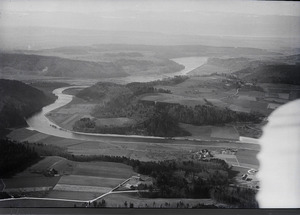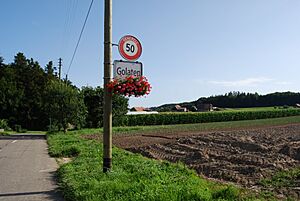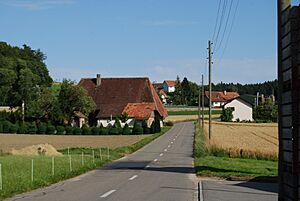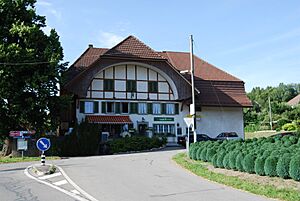Golaten facts for kids
Quick facts for kids
Golaten
|
||
|---|---|---|
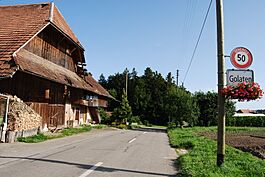 |
||
|
||
| Country | Switzerland | |
| Canton | Bern | |
| District | Bern-Mittelland | |
| Area | ||
| • Total | 2.8 km2 (1.1 sq mi) | |
| Elevation | 519 m (1,703 ft) | |
| Population
(Dec 2011)
|
||
| • Total | 290 | |
| • Density | 104/km2 (268/sq mi) | |
| Postal code |
3207
|
|
| Surrounded by | Radelfingen, Mühleberg, Wileroltigen, Kerzers, Niederried bei Kallnach | |
Golaten was once a small town, or municipality, located in the Bern-Mittelland area of the canton of Bern in Switzerland. On January 1, 2019, Golaten joined with the nearby town of Kallnach to become one larger municipality.
Contents
History of Golaten
Golaten was first mentioned in old writings between 983 and 993. Back then, it was called Gulada. Later, in 1277, its name changed to Golatun.
Ancient Settlements and Land Ownership
The oldest signs of people living in the Golaten area are Roman era bricks and pottery pieces. These were found near a farm called Wittenberg. By the 900s, St. Maurice's Abbey owned most of the land in the village. Golaten later became part of a territory known as the Herrschaft of Oltigen.
Joining Bern and Religious Changes
In 1410 or 1412, the entire Herrschaft of Oltigen, including Golaten, became part of Bern. Golaten was always part of the church area, or parish, of Kerzers. During the Protestant Reformation, a big religious change in Europe, both Golaten and Kerzers adopted the new Protestant faith. Golaten stayed part of the Kerzers parish after this.
Land Disputes and Modern Life
In 1793, Golaten had a disagreement with nearby towns in the Canton of Fribourg over a swampy area called the Golatenmoos. This area is now part of the Bernese town of Kallnach. After the French invaded Switzerland in 1798, Golaten remained part of the Canton of Bern. This happened even though the Canton of Fribourg tried to take it over. Today, about half of the people who live in Golaten travel to work in Kerzers or Bern.
Geography of Golaten
Golaten covers an area of about 2.79 km2 (1.08 sq mi). This is about 2.8 square kilometers (1.1 square miles). As of 2012[update], more than half of this land, about 51.1%, was used for farming. Forests covered about 20.4% of the area.
Land Use and Natural Features
About 8.2% of Golaten's land is covered by buildings or roads. Rivers and lakes make up about 10.4% of the area. The remaining 9.3% is land that cannot be used for farming or building. Most of the forested land is dense forest. A small part has orchards or groups of trees. For farming, 31.4% of the land is used for crops. Another 13.2% is for pastures where animals graze.
Towns and Rivers
There are two main towns within the former municipality: Golaten and Lachen. There are also several smaller groups of farmhouses, like Mannenwil and Wittenberg. Golaten is located in the Swiss plateau area. It sits near the Niederried reservoir, which is a great place for waterfowl (birds that live near water). On the southeastern side of the municipality, the Aare and Saane rivers meet.
Administrative Changes
On December 31, 2009, Golaten's old district, Amtsbezirk Laupen, was closed down. The very next day, January 1, 2010, Golaten became part of a new administrative area called Verwaltungskreis Bern-Mittelland.
Golaten's Coat of Arms
The blazon (description) of Golaten's municipal coat of arms is simple. It shows a silver horse shoe on a black background.
Population and People
As of 2019[update], Golaten had a population of 302 people. As of 2010[update], about 6.3% of the people living there were foreign nationals. Over ten years, from 2001 to 2011, the population grew by 2.1%. Most of this growth was from people moving into the area.
Languages Spoken
As of 2000[update], most people in Golaten, about 94.3%, spoke German as their main language. The second most common language was Albanian, spoken by 2.7% of the population. Portuguese was the third most common, spoken by 1.2%. Only one person spoke French.
Where People Were Born
As of 2008[update], the population was almost evenly split between males (51.1%) and females (48.9%). About 49.8% of the people living in Golaten in 2000 were also born there. Another 29.3% were born in the same canton (Bern). About 10.6% were born elsewhere in Switzerland, and 7.9% were born outside of Switzerland.
Age Groups and Households
As of 2011[update], children and teenagers (0–19 years old) made up 17.9% of the population. Adults (20–64 years old) were the largest group at 61.7%. Seniors (over 64 years old) made up 20.3%.
As of 2010[update], there were 35 households with only one person. There were also 6 households with five or more people. Most apartments were lived in all the time.
Historical Population Trends
The chart below shows how Golaten's population has changed over time:

Economy and Jobs
As of 2011[update], Golaten had a very low unemployment rate of 0.09%. This means almost everyone who wanted a job had one. As of 2008[update], 156 people worked in the municipality.
Job Sectors
- Primary Sector: 113 people worked in the primary economic sector, which mainly involves farming. There were about 22 businesses in this area.
- Secondary Sector: 14 people worked in the secondary sector, which includes things like manufacturing and construction. There were 4 businesses in this sector.
- Tertiary Sector: 29 people worked in the tertiary sector, which covers services like sales, restaurants, and education. There were 6 businesses in this sector.
About 40.1% of the people working in Golaten were women.
Commuting to Work
As of 2000[update], 31 workers traveled into Golaten for their jobs. However, 102 workers traveled out of Golaten to work in other places. This means more people left Golaten for work than came in. Most workers (73.3%) lived and worked in Golaten. About 10.7% of working people used public transportation to get to work, and 46.5% used a private car.
Religion in Golaten
From the 2000 census[update], most people in Golaten, about 80.7%, belonged to the Swiss Reformed Church. A smaller group, 3.3%, were Roman Catholic. There were also people who belonged to other Christian churches (12.08%) or were Islamic (5.44%). About 2.11% of the population did not belong to any church or did not answer the question.
Education in Golaten
In Golaten, about 58.6% of the population had finished non-mandatory upper secondary education. This is like high school after the required years. About 12.6% had gone on to higher education, like a university or a specialized college.
School System in Bern
The Canton of Bern has a specific school system. It starts with one year of optional Kindergarten. After that, there are six years of Primary school. Then, students go to three years of required lower Secondary school. Here, students are grouped based on their abilities. After lower Secondary, students can choose to continue their schooling or start an apprenticeship (learning a trade on the job).
Local Schooling
During the 2011-12 school year, 8 students attended classes in Golaten. There were no kindergarten classes. The municipality had one primary class with 8 students. Of these primary students, 12.5% were not Swiss citizens, and 12.5% spoke a different language at home than the one used in the classroom.
As of 2000[update], 41 students went to school in Golaten. Most of them (38) lived and went to school in the municipality. Only 3 students came from other towns to attend school in Golaten. In the same year, 14 residents of Golaten went to schools outside the municipality.
See also
 In Spanish: Golaten para niños
In Spanish: Golaten para niños
 | Ernest Everett Just |
 | Mary Jackson |
 | Emmett Chappelle |
 | Marie Maynard Daly |





